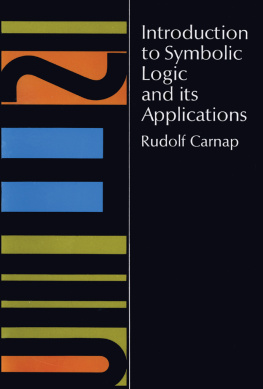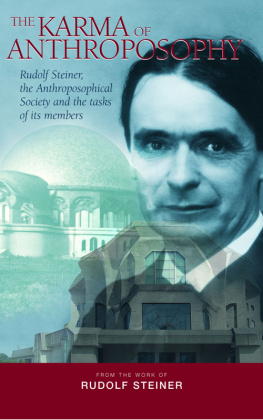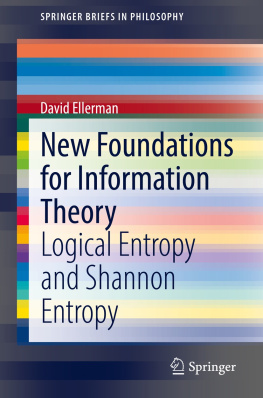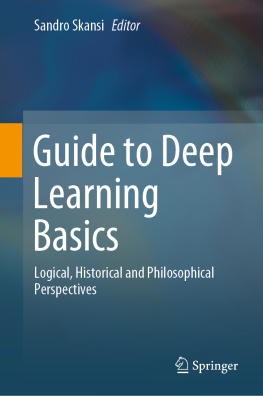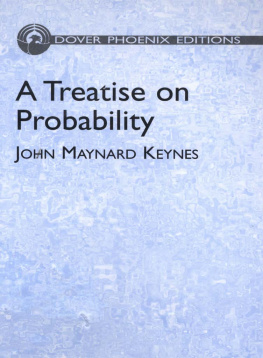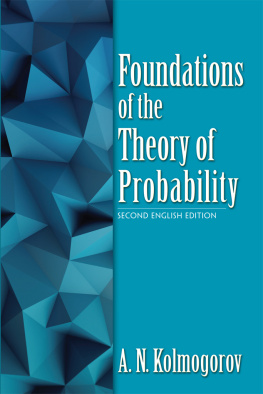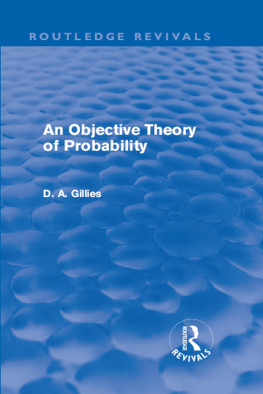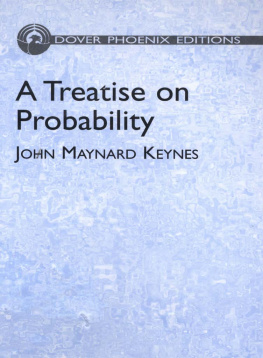Rudolf Carnap - Logical Foundations of Probability
Here you can read online Rudolf Carnap - Logical Foundations of Probability full text of the book (entire story) in english for free. Download pdf and epub, get meaning, cover and reviews about this ebook. year: 1962, publisher: The University of Chicago Press, genre: Romance novel. Description of the work, (preface) as well as reviews are available. Best literature library LitArk.com created for fans of good reading and offers a wide selection of genres:
Romance novel
Science fiction
Adventure
Detective
Science
History
Home and family
Prose
Art
Politics
Computer
Non-fiction
Religion
Business
Children
Humor
Choose a favorite category and find really read worthwhile books. Enjoy immersion in the world of imagination, feel the emotions of the characters or learn something new for yourself, make an fascinating discovery.
- Book:Logical Foundations of Probability
- Author:
- Publisher:The University of Chicago Press
- Genre:
- Year:1962
- Rating:5 / 5
- Favourites:Add to favourites
- Your mark:
- 100
- 1
- 2
- 3
- 4
- 5
Logical Foundations of Probability: summary, description and annotation
We offer to read an annotation, description, summary or preface (depends on what the author of the book "Logical Foundations of Probability" wrote himself). If you haven't found the necessary information about the book — write in the comments, we will try to find it.
Logical Foundations of Probability — read online for free the complete book (whole text) full work
Below is the text of the book, divided by pages. System saving the place of the last page read, allows you to conveniently read the book "Logical Foundations of Probability" online for free, without having to search again every time where you left off. Put a bookmark, and you can go to the page where you finished reading at any time.
Font size:
Interval:
Bookmark:

This book was produced in EPUB format by the Internet Archive.
The book pages were scanned and converted to EPUB format automatically. This process relies on optical character recognition, and is somewhat susceptible to errors. The book may not offer the correct reading sequence, and there may be weird characters, non-words, and incorrect guesses at structure. Some page numbers and headers or footers may remain from the scanned page. The process which identifies images might have found stray marks on the page which are not actually images from the book. The hidden page numbering which may be available to your ereader corresponds to the numbered pages in the print edition, but is not an exact match; page numbers will increment at the same rate as the corresponding print edition, but we may have started numbering before the print book's visible page numbers. The Internet Archive is working to improve the scanning process and resulting books, but in the meantime, we hope that this book will be useful to you.
The Internet Archive was founded in 1996 to build an Internet library and to promote universal access to all knowledge. The Archive's purposes include offering permanent access for researchers, historians, scholars, people with disabilities, and the general public to historical collections that exist in digital format. The Internet Archive includes texts, audio, moving images, and software as well as archived web pages, and provides specialized services for information access for the blind and other persons with disabilities.
Created with abbyy2epub (v.1.7.6)
r<
^QjROVE Cq^
o
^0/T M\C^
Logical Foundations of Probability
Other books by Rudolf Carnap:
Logical Syntax of Language Foundations of Logic and Mathematics Introduction to Semantics Formalization of Logic Meaning and Necessity: A Study in Semantics and Modal Logic
RUDOLF CARNAP
THE UNIVERSITY OF CHICAGO PRESS
The University of Chicago Press, Chicago & London The University of Toronto Press, Toronto 5, Canada
Copyright 1950 and 1962 by The University of Chicago All rights reserved. Copyright 1950 under the International Copyright Union. Published 1950. Second Edition 1962 Composed and printed by The University of Chicago Press Chicago, Illinois, U.S.A.
The purpose of this work. This book presents a new approach to the old problem of induction and probability. The theory here developed is characterized by the following basic conceptions: (i) all inductive reasoning, in the wide sense of nondeductive or nondemonstrative reasoning, is reasoning in terms of probability; (2) hence inductive logic, the theory of the principles of inductive reasoning, is the same as probability logic; (3) the concept of probability on which inductive logic is to be based is a logical relation between two statements or propositions; it is the degree of confirmation of a hypothesis (or conclusion) on the basis of some given evidence (or premises); (4) the so-called frequency concept of probability, as used in statistical investigations, is an important scientific concept in its own right, but it is not suitable as the basic concept of inductive logic; (5) all principles and theorems of inductive logic are analytic; (6) hence the validity of inductive reasoning is not dependent upon any synthetic presuppositions like the much debated principle of the uniformity of the world. One of the tasks of this book is the discussion of the general philosophical problems concerning the nature of probability and inductive reasoning, which will lead to the conceptions just mentioned. However, the major aim of the book extends beyond this. It is the actual construction of a system of inductive logic, a theory based on the conceptions indicated but supplying proofs for many theorems concerning such concepts as the quantitative concept of degree of confirmation, relevance and irrelevance, the (comparative) concept of stronger confirmation, and a general method of estimation. This system will be constructed with the help of the methods of symbolic logic and semantics. (However, previous knowledge of these fields is not necessarily required; all symbols and technical terms used will be explained in this book.) In this way it will for the first time be possible to construct a system of inductive logic that can take its rightful place beside the modern, exact systems of deductive logic. The system to be constructed here is not yet applicable to the entire language of science with its quantitative magnitudes like mass, temperature, etc., but only to a language system that is much simpler (corresponding to what is known technically as lower functional logic including relations and identity) though more comprehensive than the language to which deductive logic was restricted for more than two thousand years, from Aristotle to Boole.
Since this book seeks to combine various purposes, it contains material of various kinds. In preparation for the construction of a new system of inductive logic, general discussions of a philosophical or methodological nature are given (in chaps, i, ii, and iv); their purpose is argument and clarification; they are intended to lead to an understanding of the basic conception of the nature of probability and induction which is here accepted as a foundation for the construction of the system. The second part of the book (chaps, v-ix) carries out the construction of the system. This part contains less argumentation; it proceeds more geometrico, by the technical steps of definitions and proofs for theorems. One purpose of this part is to show by example what kinds of problems can be dealt with and solved in these fundamental parts of inductive logic. The other purpose lies in the results themselves. Many of the theorems (especially in chaps, v and viii) are known from the classical theory of probability; the purpose of restating them here lies in their more exact formulation and interpretation and in their proofs within the new framework. Many other theorems are stated and proved here for the first time (especially in chaps, vi, vii, and ix). Many of the theorems (both of deductive logic in chap, iii and of inductive logic in later chapters) are listed chiefly for reference purposes; they are not meant to be read through all at once. The reader will easily find those items that are of interest to him. To aid him, each chapter and each section is preceded by a summary (I often wonder why many of the books I have to read do not help me in the same way; could it be that the authors wish to compel me to read every word they have written?); the most important definitions and theorems are marked by -f ; many theorems are accompanied by brief remarks in nontechnical language indicating their contents and functions. Material not absolutely necessary for an understanding of the main text is printed in small type, e.g., digressions into more technical problems, examples, proofs, references to other authors, etc. A glossary is given near the end of the book, providing informal explanations for the technical terms most frequently used. (The theorems and definitions in this book are labeled for reference purposes in the following manner. Each theorem carries a mark like T2o-5, meaning theorem No. 5 in 20; a theorem often contains parts marked by letters a, b, etc. Definitions are labeled in a similar way with D instead of T. A reference T5C occurring in 20 is meant to refer to T20-5, part c. The numbers assigned to the sections are not always consecutive ; sometimes a number has been omitted in order to make possible later insertions; the same holds for the numbers of theorems within a section, and for the letters assigned to parts within a theorem.)
Next pageFont size:
Interval:
Bookmark:
Similar books «Logical Foundations of Probability»
Look at similar books to Logical Foundations of Probability. We have selected literature similar in name and meaning in the hope of providing readers with more options to find new, interesting, not yet read works.
Discussion, reviews of the book Logical Foundations of Probability and just readers' own opinions. Leave your comments, write what you think about the work, its meaning or the main characters. Specify what exactly you liked and what you didn't like, and why you think so.


